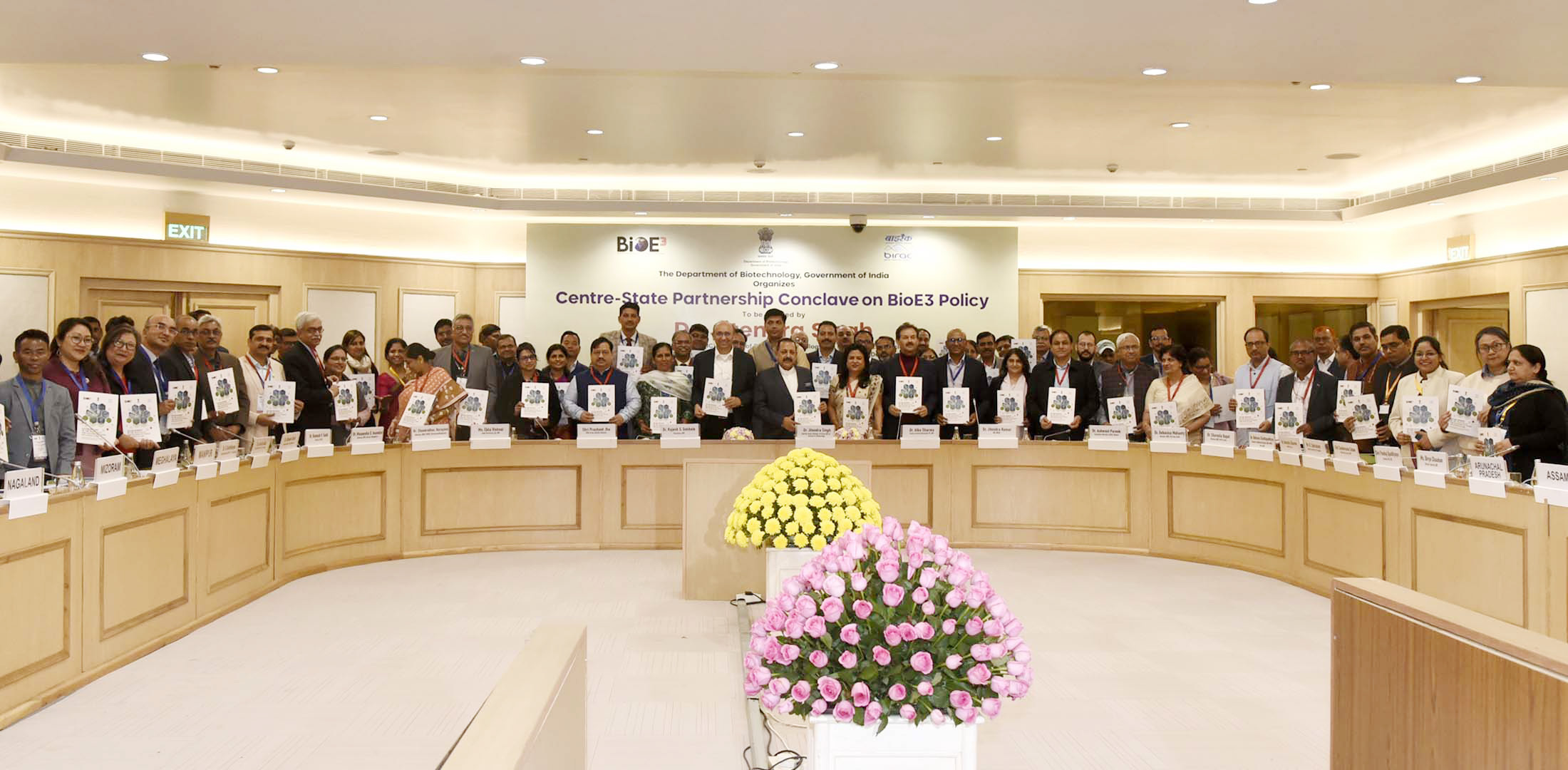India, under the visionary leadership of Prime Minister Shri Narendra Modi, reaffirmed its global commitment to sustainable innovation and climate action at the Mission Innovation Annual Gathering 2025, held in Seoul, South Korea, from April 9 to 11, 2025. The event brought together top government officials, scientists, innovators, and clean energy stakeholders from around the world. Notably, India showcased its groundbreaking BioE3 Policy (Biotechnology for Environment, Energy, and Economy) and significant progress under the Integrated Biorefineries Mission, co-led by India and the Netherlands.
Modi’s Leadership for Clean Energy
The concept of Mission Innovation (MI) originated from COP21 in 2015, where it was jointly launched by Prime Minister Narendra Modi and then-French President François Hollande to accelerate global clean energy innovation. Since then, India has been a core pillar of MI, actively driving multiple missions, especially in bioenergy and biomanufacturing, aligned with its Panchamrit goals and Net Zero 2070 vision.
India’s BioE3 Policy: Biotechnology for a Sustainable Future
India’s BioE3 Policy—Biotechnology for Environment, Energy, and Economy stands as a comprehensive and visionary framework that aims to harmonize technological advancement with ecological responsibility and economic resilience. This policy places a strong emphasis on the low-carbon and sustainable production of fuels, chemicals, and materials, thus driving India’s transition towards a green manufacturing paradigm.
A critical pillar of the BioE3 policy is the development and deployment of advanced biotechnologies for Carbon Capture, Utilization, and Bioenergy (CCUB). This integrated approach not only addresses climate change mitigation but also leverages India’s rich biomass resources to produce clean energy alternatives and green industrial inputs.
Furthermore, the policy is committed to building an innovation-driven biomanufacturing ecosystem that encourages the translation of laboratory-scale research into commercially viable technologies. It prioritizes the creation of a robust ecosystem where research & development (R&D), startup incubation, and international collaborations are seamlessly interconnected to accelerate progress in biotechnology and green industries.
Collectively, BioE3 supports India’s Amrit Kaal strategy—a roadmap for the next 25 years to transform India into a developed nation by 2047—and strongly aligns with national initiatives such as ‘Make in India’, especially within the green technology and sustainable industrialization sectors. By nurturing bio-based innovations and fostering global partnerships, the BioE3 Policy establishes India as a key driver of the global bioeconomy and a leader in shaping the future of sustainable manufacturing.
Integrated Biorefinery Mission: A Game-Changer in Bioeconomy
The Integrated Biorefinery Mission, co-led by India and the Netherlands under the Mission Innovation 2.0 initiative, emerged as a focal point of global appreciation during the Mission Innovation Annual Gathering 2025 in Seoul. India’s proactive leadership in this mission underscores its commitment to transforming the global bioeconomy through sustainable and innovative means.
This mission is playing a transformative role by facilitating the conversion of biomass into biofuels, green chemicals, and bioplastics—a critical move toward replacing fossil-based resources with renewable, eco-friendly alternatives. These biorefineries not only reduce greenhouse gas emissions but also enhance the country’s energy security and environmental sustainability.
Central to the mission is the promotion of industry-led biomanufacturing platforms, particularly those that utilize indigenous technologies and homegrown innovations. This fosters technological self-reliance and aligns with the spirit of Atmanirbhar Bharat, or a self-reliant India. By advancing scalable models of bio-based manufacturing, the mission opens up avenues for widespread industrial adoption and global technology transfer.
Another key highlight is the mission’s emphasis on building a circular economy, where agricultural residues, municipal solid waste, and other biomass resources are utilized effectively to produce valuable industrial inputs. This not only addresses the dual challenges of waste management and resource optimization but also injects vitality into rural economies by creating green jobs and alternative income streams for farmers and rural entrepreneurs.
Through the BioE3-driven biorefinery strategy, India envisions a future where manufacturing is not only decarbonized but also inclusive, innovation-led, and globally competitive. This integrated approach positions India as a game-changer in the global bioeconomy, laying a solid foundation for climate action, sustainable development, and economic transformation.
India’s Achievements in Bioeconomy Under the Modi Government
Over the past decade, under the visionary leadership of Prime Minister Narendra Modi, India has undergone a remarkable transformation in the fields of biotechnology and bioeconomy. The country’s bioeconomy expanded eightfold, growing from $10 billion in 2014 to over $80 billion by 2023, with a bold and achievable ambition of reaching $300 billion by 2030. This meteoric rise reflects not only the government’s strategic planning but also its commitment to sustainable development, green energy, and innovation-led growth.
One of the foundational pillars of this growth has been the prolific development of biotechnology infrastructure and innovation ecosystems. The government facilitated the launch of over 20 bioincubators across the country, nurturing a thriving community of more than 150 biotech startups, which have collectively delivered over 600 biotech products ranging from diagnostics and therapeutics to bio-based industrial solutions. These startups and incubators have become crucial engines of innovation, job creation, and economic diversification.
In addition, the Modi government has driven flagship projects focused on second-generation (2G) ethanol, algal biofuels, and waste-to-energy technologies, positioning India as a global hub for alternative energy solutions. These initiatives have significantly reduced dependence on imported fossil fuels and promoted cleaner, indigenous sources of energy, while also addressing environmental concerns such as crop residue burning and urban waste.
Furthermore, there has been massive public and private investment in establishing biotech parks, biorefineries, and bioindustrial clusters. These large-scale facilities have not only attracted global partnerships but have also enabled India to scale up its biomanufacturing capabilities, fostering technology transfer, enhancing export potential, and rural-industrial integration.
Together, these achievements underscore the Modi government’s robust and forward-thinking approach to leveraging biotechnology for national development. The focus on bioinnovation, sustainability, and economic inclusivity has laid a strong foundation for India to emerge as a global leader in the bioeconomy, making meaningful contributions to climate action, industrial transformation, and the goals of Viksit Bharat 2047.
India’s Global BioInnovation Footprint
India’s proactive participation at the Mission Innovation (MI) Annual Gathering 2025 in Seoul not only highlighted its domestic advancements in biotechnology and clean energy but also reaffirmed its emerging role as a global leader, particularly within the Global South, in democratizing clean and sustainable technologies. As climate challenges intensify and the demand for green alternatives rises, India’s approach to biotechnology, embodied in its BioE3 Policy, has positioned the nation not merely as a consumer of global technology but as a provider and exporter of scalable, inclusive, and affordable solutions.
The BioE3 Policy, which integrates biotechnology for environmental sustainability, energy resilience, and economic empowerment, has laid the groundwork for India to share its models and technological frameworks with countries in Africa, the ASEAN region, and Latin America. These regions, which face similar development and climate challenges, stand to benefit greatly from India’s low-cost, adaptable, and eco-conscious technologies in biomanufacturing, waste-to-energy conversion, and carbon capture.
By presenting itself as a knowledge partner and innovation collaborator, India is expanding its global bioinnovation footprint, especially among developing nations that require access to clean technology without prohibitive costs. India’s offering of technology-sharing models, policy frameworks, and institutional expertise contributes to capacity-building, South-South cooperation, and the collective acceleration of the green transition across continents.
This strategic shift from being a technology taker to a technology maker reflects the success of the Modi government’s decade-long investment in research, infrastructure, and global diplomacy in science and technology. Through this, India is not only advancing its path toward Viksit Bharat 2047 but also acting as a catalyst for global sustainability and equity in clean energy innovation.
Appreciating the Modi Government’s Vision
The visionary leadership of Prime Minister Narendra Modi has been instrumental in redefining India’s developmental trajectory by seamlessly integrating bioeconomy, climate action, rural livelihoods, and green industry into a unified national strategy. This convergence is not only a testament to India’s commitment to sustainable development but also reflects the government’s deep understanding of global challenges and opportunities. Initiatives such as the International Solar Alliance, the BioE3 Policy, and the establishment of integrated biorefineries illustrate how India is actively reshaping the global dialogue on clean energy equity and access, especially for developing nations.
Prime Minister Modi’s approach stands out for its emphasis on tech-driven, inclusive, and sustainable growth. By fostering innovation at the grassroots, empowering rural communities through bio-based industries, and promoting circular economy principles, the government has set a new benchmark in environmental governance. This holistic strategy has consistently earned international recognition and appreciation, positioning India as a credible leader in global climate and technology forums. The Modi government’s ability to blend traditional knowledge with cutting-edge innovation has created a model that is both scalable and equitable.
Socio-Economic Benefits to India:
India’s biotechnology-led development has significantly contributed to public health, food security, and environmental sustainability—core pillars of social progress. Under the Biotech-KISAN (Krishi Innovation Science Application Network) initiative, over 150 biotech-led farmer clusters have been established nationwide, empowering farmers with region-specific biotechnologies, including biofertilizers, drought-resistant seeds, and disease control methods. These interventions have improved crop yields by up to 20–25% in some regions and reduced reliance on chemical inputs, directly benefiting marginal and smallholder farmers, who form over 85% of India’s farming community. Additionally, the promotion of biodegradable plastics and eco-friendly materials under the bioeconomy strategy has begun to mitigate pollution, leading to cleaner ecosystems. Education and awareness programs led by the Biotechnology Industry Research Assistance Council (BIRAC) and the Department of Biotechnology (DBT) have also mainstreamed biotechnology literacy among youth, fostering a scientific temperament and encouraging rural innovation hubs and bio-villages that integrate biotechnology into sustainable rural development.
India’s bioeconomy growth has triggered catalytic effects across multiple economic sectors, driving revenue generation, attracting global investment, and enhancing trade prospects. According to NITI Aayog, India has the potential to become a global hub for biomanufacturing, and the sector is expected to create over 10 million green jobs by 2030. The blending of ethanol in petrol, boosted by the Ethanol Blending Programme (EBP), has already saved India ₹50,894 crores in foreign exchange between 2014 and 2023, according to data from the Ministry of Petroleum & Natural Gas. Furthermore, the use of bio-CNG and compressed biogas (CBG) in public transport and industry is unlocking a new revenue stream for rural entrepreneurs through the SATAT (Sustainable Alternative Towards Affordable Transportation) scheme, under which 5,000 CBG plants are planned. India’s biotech exports, including bio-pharmaceuticals and enzymes, are also on the rise, crossing USD 12 billion in FY 2022-23, contributing significantly to the trade balance. With fiscal incentives, FDI-friendly reforms, and world-class biotech parks, India is increasingly viewed as an investment destination for green technologies, giving a strategic economic edge in the Fourth Industrial Revolution (4IR).
Looking forward, India is strategically poised to emerge as a global powerhouse in bio-based manufacturing and sustainable industrial practices. Backed by a network of strong international alliances, robust domestic policies, and a thriving innovation ecosystem, the nation is steadily advancing towards its vision of Viksit Bharat 2047. The discussions, collaborations, and policy endorsements that took place during the Mission Innovation 2025 Annual Gathering in Seoul served as yet another milestone, reaffirming India’s readiness to lead the global transition toward a cleaner, greener, and technologically empowered future.
India’s continued efforts to build a resilient, low-carbon economy based on scientific innovation and socio-economic inclusion underscore the far-reaching impact of Prime Minister Modi’s governance model. As the world navigates the complexities of climate change, energy equity, and sustainable development, India stands as a beacon of possibility, offering not just solutions but leadership.
The views and opinions expressed here belong solely to the author and do not reflect the views of BlueKraft Digital Foundation.







